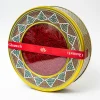Eye diseases are a common problem in the elderly throughout the world. In European countries, age-related macular degeneration (AMD) is the main cause of visual loss in people over 55 years. Even though ophthalmology has seen tremendous progress, there are still ocular diseases that new science is not able to cure. The retinal function is very fundamental in eyesight. Unfortunately the neurodegenerative disease can stop retinal function. The good news is that saffron’s neuroprotective properties could solve the problem or impede the fast progression of the degeneration.
A Return to Traditional Medicine
As new science failed to meet the expectations for treating fatal diseases in the last few decades, people felt they needed to pay attention to herbal medicines. On the other hand, doctors and pharmacists have become more aware of the many side effects of some chemical drugs. So they hope that by re-studying herbal drugs in so-called “folk” medicine, they can create drugs with fewer side effects, better tolerance, and efficacy similar to chemical drugs.
Maybe this is why the word “folk” is no longer correct, and “traditional” seems to be a neutral/impartial adjective for old medicine.
Long story of saffron usage as drug
Saffron has long been used in folk medicine to treat different types of conditions such as colds, coughs, and digestive issues. Also, anti-tumor, radical scavenger, memory-enhancing, and hypolipidemic are the properties that modern studies have related to saffron extract and its active constituents.
The properties of saffron in Recent studies go beyond that list. Various studies have confirmed that “red gold” contains several compounds that could be beneficial for eye health and some ocular diseases. In this article, we will discuss the various ways saffron can benefit your eyesight and how you can incorporate it into your diet.
Components of saffron against free evil radicals
We all heard about the magical effect of anti-oxidants on harnessing cancers. Saffron contains carotenoids which are plant pigments that have antioxidant properties. Antioxidants can guard our cells against damage caused by free radicals, which can lead to cancer, vision loss, and other eye problems. Additionally, crocin in the spice is considered a compound that has been found to improve night vision and reduce redness in the eyes.
Saffron is replete with vitamins like A, C, and B6, and minerals like magnesium, and potassium. Vitamin A is key for eye health, with a role in preventing night blindness. Vitamin C helps to promote blood circulation to the retina. This reduces inflammation in the blood vessels, which can aid in vision improvement and protect them from oxidative stress caused by free radicals. Potassium protects the delicate blood vessels in the eyes from damage while magnesium could act as an anti-inflammation factor.
A hope to cure retina
Sadly, at present, no cure you can find for most retinal diseases. Against this backdrop, saffron appeared on the scene as an element to deal with the morphological and functional effect of degeneration of retinal neurons.
A study done by 5 Italian researchers( from the University of L’Aquila) confirmed that saffron treatment reduces photoreceptor death, slows down the progression of neuro-inflammatory processes, and eventually improves and maintains visual function trials in age-related macular degeneration and Stargardt patients.
The mechanism of treatment
The evidence coming from animal models and clinical trials of the Italian researcher’s study reveals that the ways of saffron’s action on this disease are not only restricted to diminishing reactive oxygen species production, as it is once believed. The researcher believes that the mechanism of healing the retina by saffron is complex as saffron can switch on some genes that can heal the retina and increase its tissue resilience. Saffron’s crocin, in addition, is a critical factor in defining the efficacy of treatment.
According to the above-mentioned research, saffron affects the genes whose task is to regulate the fatty acid of the right cell membrane, and this issue increases the amount of vision.
Saffron may also help to reduce inflammation within the central nervous system (neuroinflammation ) which may relate to degenerative diseases.
The case of early age-related macular degeneration
Clinical studies indicate that retinal flicker sensitivity in early age-related macular degeneration (AMD) would be healed by taking short-term saffron supplementation. Also, beyond the antioxidant properties of nutritional carotenoids, the study’s findings provide significant clues that carotenoids may have a positive effect on AMD unexpectedly.
Large, soft yellow deposits under the retina (Drusen), hyper-/hypopigmentation hyper-/hypopigmentation of the retinal pigment epithelium (RPE), and a moderate loss of central vision are symptoms that happen in AMD as a degenerative disease of the macula.
Additionally, saffron may be useful for treating glaucoma, a condition that causes vision loss due to increased pressure in the eyes.
Routine dishes with great effect
To get the most benefit from saffron for your eyesight, you should incorporate it into your diet regularly. So, as doctors say oral supplementation of saffron is the simple way to save your eye. You can add ground saffron or its threads to your routine dishes such as soups, stews, curries, and rice dishes. Alternatively, daily supplementation could be accomplished by taking different pills, capsules, or syrup containing the red gold.
Queen of Flower Company commits to providing the highest quality saffron that can decorate your dishes and at the same time equip your immune system with antioxidative, anti-inflammatory, antimicrobial, as well as antinociceptive agents of saffron threads.
The dosage you need
If you are a newcomer to the saffron world you need to change your lifestyle and test the culinary enriched by saffron. The spice like any herbal drug has no immediate effect, so you need to be a patient ill.
A 2019 research review has shown that people with AMD need to take oral supplementation of saffron for over 3 months to experience a significant improvement in their visual acuity. The amount of saffron supplements must be 20-50 mg per day to reach the the desired result. The patient, alternatively, can take a daily dose of 5-15 mg of crocin supplements.
Side effects of saffron
In a review of the use of saffron for macular degeneration, skin or eye staining due to intense saffron staining, nausea, sedative effects, changes in appetite, and headache have been reported as side effects.
But in this research, it is clear that if 20 to 50 mg of saffron or 5 to 15 mg of crocin are consumed every day, the patients will not have any problems. Also, researchers did not observe any major side effects during one month in people who took 20 mg of crocin per day.
The researchers of the aforementioned research have reported that people can take doses of 200 to 400 mg of saffron supplement for 7 days, and at least for most of them, it is not harmful, although, at the end of the research, one of the participants had unusual bleeding from the uterus.
Researchers have recommended that people with kidney dysfunction, bleeding disorders, and people who use blood thinners consult a specialist doctor before consuming saffron. In this article, it is warned that saffron supplements may be dangerous for pregnant people, especially since high doses of saffron may cause abortion.
In Conclusion
Golden spice can help improve vision, reduce redness in the eyes, and even reduce symptoms of certain eye diseases. First and foremost, as it is packed with antioxidants, it can help protect your eyes from harmful free radicals and improve circulation in the retina. Additionally, it may be useful for people with certain eye diseases. For best results, remember to incorporate saffron into your diet regularly. If you are suffering from early age-related macular degeneration you do not need to worry as saffron supplement can slow down the disease significantly take it To make a long story short, we can add to the list of saffron’s titles another title by calling it a “eye-opener” spice.
FAQ
Does taking saffron stop macular degeneration?
A 2017 study on age-related macular degeneration(AMD) found a significant improvement in visual acuity and contrast sensitivity or at least a slowdown of the progression of the disease after having a short-term intake of saffron.
How can you take saffron for ARMD?
In order to have all the benefits of saffron, a sufferer from AMD needs an oral supplement for 3 months They also can also take supplements containing crocin as an antioxidant component of saffron.
How does saffron heal AMD?
The effects of saffron on AMD are not only due to the spice’s antioxidant properties, but also related to saffron’s potential in regulating some genes which increase tissue resilience, and reduce neuroinflammation.













Hi there! This is my 1st comment here so I just wanted to give a
quick shout out and tell you I really enjoy reading through
your posts.
Wow, fantastic blog format! How long have you
ever been blogging for? you made running a blog look easy.
The total glance of your website is wonderful, let alone the
content!
Excellent web site. Lots of helpful information here. I’m sending it to a few friends
ans also sharing in delicious. And obviously, thanks in your sweat!
Wow, incredible weblog structure! How lengthy have you ever been running a blog for?
you made blogging glance easy. The total glance of your website is wonderful,
as smartly as the content material!
Hi! This is my first visit to your blog!
We are a group of volunteers and starting a new project in a community in the same niche.
Your blog provided us valuable information to work on. You have done a marvellous job.
Hi, I check your blogs on a regular basis. Your humoristic style is awesome, keep doing what you’re doing!
I do not even know how I ended up here, but I thought this post was good.
I don’t know who you are but certainly you’re
going to a famous blogger if you aren’t already 😉 Cheers!
Pingback: Everything about Saffron Extract: Doses & Effects